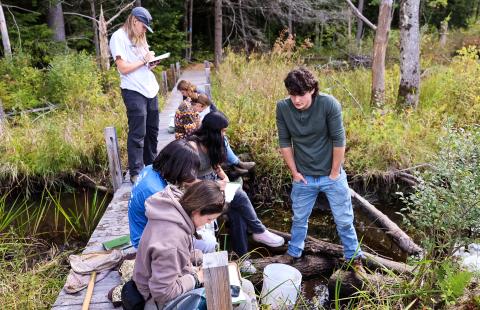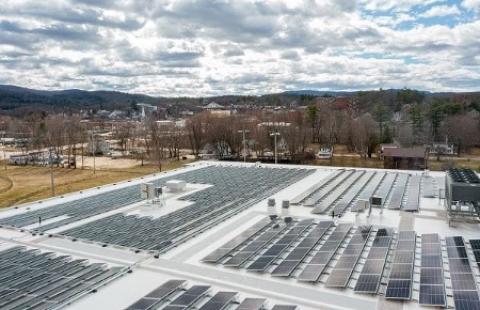Be part of the solution
Our global society faces many challenges to creating resilient, healthy, and socially equitable ways of living that ensure future generations will have access to the resources on which we depend.
Sustainability studies focuses on the interdisciplinary benefits of the sustainability concept. We explore how to make a more sustainable and equitable future by developing combined skill sets from fields including business, the social sciences, the arts and humanities, environmental science, and public health. Students:
- Engage in interdisciplinary learning at multiple scales (local, national, global)
- Learn systems-thinking approaches for identifying and resolving sustainability-related problems
- Develop skills to promote equitable community, collaboration, and collective action while addressing sustainability-related challenges
- Develop professional and transferable skills for employment in sustainability professions
Curriculum & Requirements
| Course | Title | Credits |
|---|---|---|
| Major Requirements 1 | ||
| SU 2111 | Introduction to Sustainability Studies | 4 |
| PBH 2000 | Foundations of Public Health (WECO) | 4 |
| SU 3112 | Social Science Perspectives on Sustainability (DICO,GACO) (DICO, GACO) | 4 |
| SU 3113 | Conversations in Sustainability | 1 |
| SU 3115 | Economic and Ecological Sustainability (GACO,QRCO) (QRCO) | 4 |
| SU 3333 | Environmental Humanities (WRCO) (WRCO) | 4 |
| SU 4111 | Sustainability Project Design | 4 |
| Methods Courses (Choose two, at least one must be a TECO) | 8 | |
AG 2100 | Design Software Basics (TECO) | |
AN 4415 | Methods of Social Research (TECO) | |
GE 2050 | GIS I: Introduction to Geographic Information Systems (QRCO,TECO) | |
CM 2775 | Media and Cultural Studies (TECO) | |
CM 3095 | Technical Communication (TECO,WRCO) | |
PBH 2200 | Assessment and Communication in Public Health (TECO) | |
CM 2007 | Strategic Communication | |
AR 1045 | Art Foundations 2D: Composition and Content | |
AR 1075 | Art Foundations Drawing: Line and Language | |
CM 2915 | Communication and Leadership | |
CM 3400 | Interactive Web Communication | |
EN 2710 | Creative Writing | |
EN 3125 | Advanced Composition | |
EN 3135 | Non-Fiction Workshop | |
ESP 4405 | Environmental Outreach and Communication | |
GE 3050 | GIS II: Advanced Geographic Information Systems | |
GE 4010 | Remote Sensing and Digital Image Processing | |
GE 4050 | Geospatial Technology Applications | |
MA 2300 | Statistics I (QRCO) | |
PBH 3010 | ||
PBH 3200 | ||
SS/SW 3705 | Social Statistics (QRCO) | |
| Focus Courses: Choose 6 courses from list below or Methods list above (cannot double count) | 18-24 | |
| Arts, Humanities, and Communication | ||
AR 3575 | Art and Sustainability | |
AG 2100 | Design Software Basics (TECO) | |
AG 3200 | Imagery | |
AN 3115 | ||
AR 3015 | Painting | |
AR 3125 | Painting: Process Exploration | |
AR 3295 | Printmaking: Cut, Carve, Etch | |
AR 3325 | Printmaking: Silkscreen and Alternative Processes | |
CM 2995 | Professional Social Media | |
HI 3342 | New Hampshire and New England History | |
| Economy and Entrepreneurship | ||
BUS 1400 | Principles of Economics (GACO) | |
BU 3220 | Business and the Environment | |
ENT 3030 | Social Entrepreneurship | |
ENT 2040 | Foundations of Innovation and Entrepreneurship | |
ECN 3100 | Intermediate Macroeconomics | |
ECN 3200 | Intermediate Microeconomics | |
ECN 4400 | Current Topics in Economics | |
ENT 3052 | Executing for Growth and Sustainability (Executing for Growth and Sustainability) | |
GE 3080 | Economic Geography | |
TMP 3060 | Ecotourism | |
| Ethics and Equity | ||
CJ 3157 | Society, Ethics, and the Law (DICO) | |
CM 3485 | Global Perspectives in the Media (GACO) | |
PBH 4000 | Ethics, Social Justice, and Policy in Public Health | |
PO 3355 | Women in World Politics | |
PO 3505 | Politics and Conflict in the Middle East (GACO,INCO) | |
PY 3310 | Environmental Ethics (WECO) | |
PY 3330 | Business Ethics (DICO,INCO) | |
SO 3375 | Sociology of Race and Ethnicity (DICO) | |
SW 3450 | Social Welfare Policy and Services | |
SW 3490 | ||
| Environmental sciences | ||
AP 2500 | Natural History and Ecology for Adventure Educators | |
BI 1110 | Biological Science I (TECO) | |
BI 1120 | Biological Science II | |
BI 2070 | Botany | |
BI 3240 | Conservation (DICO,GACO) | |
BI 3260 | Freshwater Ecology | |
BI 4050 | Ecology (QRCO,WRCO) | |
BI 4800 | Current Environmental Issues | |
CH 3600 | Environmental Chemistry (INCO) | |
EPL 3150 | Introduction to Permaculture | |
ESP 2100 | Introduction to Environmental Science and Policy I | |
ESP 2110 | Introduction to Environmental Science and Policy II | |
ESP 3325 | Climate, Risk, and Adaptation (GACO,INCO) | |
ESP 3335 | Environmental Geology (TECO) | |
ESP 4310 | Advanced Conservation Ecology | |
MT 2000 | Fundamentals of Meteorology and Climatology (GACO) | |
MT/ESP 4440 | ||
| Public Health, Policy and Governance | ||
ESP 2305 | Foundations of Environmental Policy (WRCO) | |
ESP 3550 | Environment and Health (WECO) | |
ESP 3600 | Special Topics in Environmental Policy | |
ESP 4325 | Decision Making in Environmental Management | |
PBH 3400 | Program Planning for Public Health (WRCO) | |
PBH 4000 | Ethics, Social Justice, and Policy in Public Health | |
PO 2025 | Public Administration (DICO) | |
PO 3060 | Political Analysis and Policy (WRCO) | |
| Sustainable Development and Planning | ||
EPL 2105 | Community Planning | |
EPL 3100 | Environmental Planning | |
ESP 3270 | ||
ESP 3325 | Climate, Risk, and Adaptation (GACO,INCO) | |
ESP 3550 | Environment and Health (WECO) | |
ESP 4325 | Decision Making in Environmental Management | |
GE 3030 | Urban Geography | |
GE 3050 | GIS II: Advanced Geographic Information Systems | |
GE 4010 | Remote Sensing and Digital Image Processing | |
GE 4040 | ||
SO 3040 | Environmental Justice | |
SO 3395 | ||
SO 3605 | Sustainability in Practice (WECO) | |
TMP 3070 | Cultural and Heritage Tourism | |
| General Education | ||
| EN 1400 | Composition | 4 |
| IS 1115 | Tackling a Wicked Problem | 4 |
| MA | Mathematics Foundations | 3-4 |
| CTDI | Creative Thought Direction | 3-4 |
| PPDI | Past and Present Direction | 3-4 |
| SIDI | Scientific Inquiry Direction | 3-4 |
| SSDI | Self and Society Direction | 3-4 |
| Directions (choose from CTDI, PPDI, SIDI, SSDI) 2 | 4-8 | |
| GACO | Foreign Language 3 | 6-8 |
| Electives | 27 | |
| Total Credits | 120 | |
- 1
At least half of the credits in the major must be at the 3000/4000 level.
- 2
Directions should total 20 credits (unless the major has a waiver for a specific Direction).
- 3
The foreign language requirement for all BA degrees calls for 0-8 credits: one year of one language (6-8 credits); or one 3000/4000 level world language course (3 credits); or being a native speaker of a language other than English (zero credit). American Sign Language I and II fulfill this requirement; however, American Sign Language does not satisfy the Global Awareness Connection.
| Year One | Credits | |
|---|---|---|
| SU 2111 | Introduction to Sustainability Studies | 4 |
| SU 3333 | Environmental Humanities (WRCO) | 4 |
| MA | Mathematics Foundations | 3-4 |
| IS 1115 | Tackling a Wicked Problem | 4 |
| EN 1400 | Composition | 4 |
| PPDI | Past and Present Direction | 3-4 |
| SSDI | Self and Society Direction | 3-4 |
| Credits | 25-28 | |
| Year Two | ||
| PBH 2000 | Foundations of Public Health | 4 |
| SU 3115 | Economic and Ecological Sustainability (GACO,QRCO) | 4 |
| SU 3113 | Conversations in Sustainability | 1 |
| CTDI | Creative Thought Direction | 3-4 |
| SIDI | Scientific Inquiry Direction | 3-4 |
| Directions (choose from CTDI, PPDI, SIDI, SSDI) | 4-8 | |
| One Focus Area Course | 3-4 | |
| Electives | 6-8 | |
| Credits | 28-37 | |
| Years Three and Four | ||
| Four Focus Area Courses | 12-16 | |
| Two Methods Courses (one TECO) | 6-8 | |
| SU 3113 | Conversations in Sustainability | 1 |
| INCP | Integrated Capstone | 3-4 |
| GACO | Foreign Language | 8 |
| Electives | 17-21 | |
| SU 4111 | Sustainability Project Design | 4 |
| Credits | 51-62 | |
| Total Credits | 120 | |
Sustainability Coordinator, Sustainability Analyst, Sustainability Project Manager, Sustainability Marketer, Nonprofit Administrator, Sustainability Communicator, Sustainability Entrepreneur, Planner
Explore Program Details
Explore Today.
Realize Tomorrow.















